|

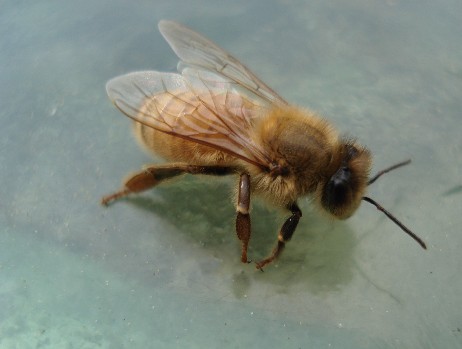
The Honeybee is best described as small,
gold, brown and fuzzy as compared to other types.
Aacute Pest Control is unequaled in experience and uniquely positioned to
help you most effectively in Honeybee situations.
The Honeybee probably generates the most confusion for people. Much of what
people think is common knowledge about Honeybees and alike is actually not true,
or confused with other types. Aacute Pest Control removes Honeybees
in Massachusetts.
For Wasps, Hornets and other Stinging insects please go to Stinging
Insects.
Close-up Pictures of Honeybees.
Also please continue reading below. There is many
pictures of Honeybee Removals below after the reading.
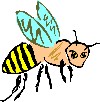
The Honeybee Tour starts by reading the valuable information
below.
Please do not skip the reading below.
Honeybee Life Cycle.
Honeybees build their nest from wax and honey. During the warm months the worker
bees fly to flowers to pollinate and return with the nectar. Inside their bodies
is where the honey and wax is actually made. The wax is slowly pushed out of
their body from between the plates of their armored body. The honey is formed in
their HONEY STOMACH and regurgitated. They use these 2 materials to build the honeycomb that you've
undoubtedly seen before.
Each honeycomb is lined up in layers next to another so that the layers are
stacked. The bees walk freely from one layer to another. After the wax comb is
made the Queen will lay one egg in each cell.
The larva is born and the worker bees feed it until it grows up. When it is
ready to pupate the worker bees cap it over with a light wax material. The larva pupates to
an adult. The adult chews it's way out of the cell to help in colony duties. The
empty cells are used over again and again, from year to year. The bees build a nest as
described and inhabit it for many years, often more than 10 years and sometimes
decades.

When the flowers are in bloom in the spring and the colony has a large amount
of stores and excess bees, the worker bees can actually create new queens.
They'll build a few extra large cells and put special high quality food in these
cells and a new Queen will grow up in each of these larger cells. The first
Queen to hatch will sting and kill the other Queens to death while still in
their cells. This new Queen will soon fly out of the colony and attract a male
bee known as a Drone to mate with her. The mating begins high in the air and
continues during a freefall in her maiden flight.
Honeybee Swarms.
When the Queen returns she may be fertilized for life, which is
many
years. She'll command some of the excess bees in the colony to leave with her.
The swarm is sudden and in extremely large numbers. Some of our customers have
been quoted as saying "The sky got dark because there was so many
bees!!!!". We doubt the sky got dark, but you can understand what we mean.
Depending on the weather and other environmental conditions you could expect
this to happen in May or June.

This swarm of bees will be guided by the Queen and Scout Bees. They will usually be looking
for a void or a protected space inside something to build a new colony. In nature they
like a big hollow of a tree. Rarely, they build right out in the open hanging
from a branch, but this is very rare. But a space in your wall will do fine.
What is important to know is that the search for a new colony site can go on for
days. Every day they stop to stay overnight some place. Often this takes place
on a tree branch. The Queen and bees will cling tightly to each other to form a
large cluster of bees - no wax or honey - just straight bees, thousands of them. The
cluster is usually about 10 inches to 20 inches across.
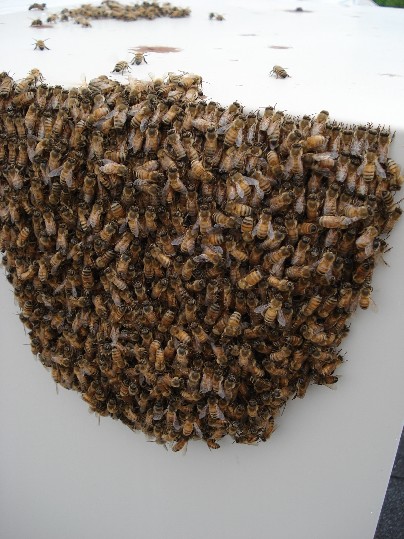
Here's a very
small swarm of bees attached to an A/C unit.
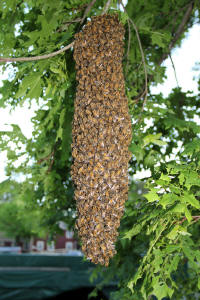
Picture of a swarm
of Honeybees in a tree. - Click to enlarge.
During these rest stops they
attract much attention from people. Some people get scared because they think
the swarm may suddenly become airborne and attack people. For a cluster of bees the following is widely accepted advice: If people are not immediately threatened by their presence
then please leave them alone. They won't stay long, maybe a day or two at the
longest. In this described state they are rarely aggressive. There is
usually no need to interfere with them. We would ask if at all possible for
you to call us or e-mail us and let us know the location of the swarm (we log
swarm locations and dates), but don't touch them or go near them. A minimum distance of at least
30 feet is usually
plenty safe. If you insist on
having us take the cluster of bees off your property, we can, but it is a charge
visit. Prices vary according to situation.
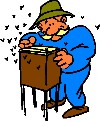
Sometimes people call and ask if we
or other Beekeepers want them. We can't speak for other Beekeepers needs, but we
think wild bees are best left in the wild. Beekeepers can mail-order pathogen
free bees for a low cost if they really want bees.
At Aacute Pest Control we only advocate handling, removing, killing or otherwise
dealing with wild Honeybees if they become a threat to people or move into your house.
If they build a colony in your home they construct a honeycomb at an
alarming rate. We have documented honeycombs being built at a rate of
almost one (1) pound per day for several days in a row. The nest will eventually
get up to around 30 pounds and maybe more! Yes that's right, all that in your walls! We have
removed hundreds that size from people's walls.
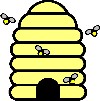
If a colony becomes established inside your walls then we recommend
that you have us
do an Inspection so we can work out the details of their removal.
Please see the Honeybee Picture Tours below.
|

#1
Remove a colony from a wall.
|

#2
Remove a colony from a garage
ceiling.
|
#3
Remove a Colony from a roof soffit.
 A short video of a Honeybee pollinating - Warning: High Bandwidth users only.
A short video of a Honeybee pollinating - Warning: High Bandwidth users only.
Traps
(That catch you, not them)
Get Honeybees removed from my house
or business in Massachusetts. Someone that removes Honey Bees from my
residential property. Bee Keeper that takes Honeybees. Beekeeper that will
remove Honey Bees.
|